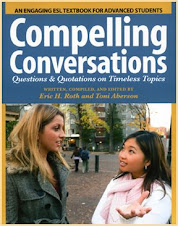A Way With Words: Another Resource for English Teachers and Word Mavens
Do you have a way with words? Are you a lover of word trivia and origins? Are you an English teacher? If so, consider listening to the celebrated public radio show!
Forget forcing students to memorize boring vocabulary lists. Get your English students engaged in the story of English words, their origins, and multiple uses.
A Way with Words, another outstanding public radio show, is co-hosted by Martha Barnette and Grant Barrett (who writes an annual buzzwords of the year survey for the New York Times.) The hour long program examines the English language as the hosts answer listeners' questions about intriguing aspects of the English language, including grammar, vocabulary, idioms, slang, dialects, speaking, and writing. The friendly format also demonstrates excellent discussion skills. Web visitors can also listen to episodes online, down MP3s, and subscribe to podcasts for free.
While the show is better for English teachers and writers than most English language learners or adult ESL students, listeners will gain a greater appreciation for and knowledge of our strange, fascinating language.
Features:
• Free downloads
• Thematic episodes accompanied by a reading text
• Discussion points
• All past episodes are archived chronologically for easy browsing
• Free subscriptions
Site URL: http://www.waywordradio.org/
Check it out!
Word mavens might also be interested in New York Times column on buzzwords:
http://ideas.blogs.nytimes.com/2008/12/22/whats-your-buzzword-of-2008/#comment-2671
As you might suspect, I recommended "lifequake" as a buzzword for 2008 because so many lives suffered sudden changes, like in earthquakes.
Ask more. Know more. Share more.
Create Compelling Conversations.
Visit www.CompellingConversations.com
Showing posts with label American idioms. Show all posts
Showing posts with label American idioms. Show all posts
Friday, December 26, 2008
Saturday, August 16, 2008
How do you teach the difference between "make" and "do" in your English classes?
Make vs. Do
What do you do? What do you make?
These simple words cause lots of confusion for English language learners. I’ve spent time helping a very wide range of ESL classes – from advanced adult education and community college students to intermediate English students in summer courses and regular university courses – struggle with idioms with “make” and “do.”
Here is a quick, imprecise guide that helps clarify the issue.
Look at some common expressions with “do”.
• Do the dishes.
• Do some chores.
• Do your work.
• Do exercises.
• Do your best.
• Do it over.
• Do the report.
Do is used to describe an activity that you have to do, often over and over again. For instance, we “do the dishes” and “do the laundry” many times. Do also contains an element of duty and responsibility.
Now, take a look at some expressions with “make”.
• Please make time.
• You make dinner.
• You make drawings.
• You make decisions.
• You make plans.
• Your make reservations.
• You make money.
• You make friends.
Make is used to describe a creative activity or something you choose to do. You choose, for instance, to make plans, make friends, and make decisions. You have choices.
Why do we say “make dinner” if we have to do it over and over? Perhaps because cooking is seen more as a creative activity than a chore. But cleaning the table, and cleaning the dishes are just chores so we say “do the table” and “do the dishes.” That’s also why Americans say “make money” instead of “do money.” Making money is seen as both creative and a choice. Idioms are cultural. Sometimes Americans will use the verb “make” in a way that might seem strange, but “make a decision” to “do your best” and learn practical workplace expressions.
Finally, I encourage students to work together in small groups and create their own list of idioms with make and do. When I’m lucky and have time, I like to ask students to come to the white board and write their collection of idioms on the board. Homework, of course, is asking them to choose 5-10 idioms and write complete sentences.
So how do you teach the difference between do and make to your English students?
Ask more. Know more. Share more.
Create Compelling Conversations.
Visit www.CompellingConversations.com
What do you do? What do you make?
These simple words cause lots of confusion for English language learners. I’ve spent time helping a very wide range of ESL classes – from advanced adult education and community college students to intermediate English students in summer courses and regular university courses – struggle with idioms with “make” and “do.”
Here is a quick, imprecise guide that helps clarify the issue.
Look at some common expressions with “do”.
• Do the dishes.
• Do some chores.
• Do your work.
• Do exercises.
• Do your best.
• Do it over.
• Do the report.
Do is used to describe an activity that you have to do, often over and over again. For instance, we “do the dishes” and “do the laundry” many times. Do also contains an element of duty and responsibility.
Now, take a look at some expressions with “make”.
• Please make time.
• You make dinner.
• You make drawings.
• You make decisions.
• You make plans.
• Your make reservations.
• You make money.
• You make friends.
Make is used to describe a creative activity or something you choose to do. You choose, for instance, to make plans, make friends, and make decisions. You have choices.
Why do we say “make dinner” if we have to do it over and over? Perhaps because cooking is seen more as a creative activity than a chore. But cleaning the table, and cleaning the dishes are just chores so we say “do the table” and “do the dishes.” That’s also why Americans say “make money” instead of “do money.” Making money is seen as both creative and a choice. Idioms are cultural. Sometimes Americans will use the verb “make” in a way that might seem strange, but “make a decision” to “do your best” and learn practical workplace expressions.
Finally, I encourage students to work together in small groups and create their own list of idioms with make and do. When I’m lucky and have time, I like to ask students to come to the white board and write their collection of idioms on the board. Homework, of course, is asking them to choose 5-10 idioms and write complete sentences.
So how do you teach the difference between do and make to your English students?
Ask more. Know more. Share more.
Create Compelling Conversations.
Visit www.CompellingConversations.com
Subscribe to:
Posts (Atom)





